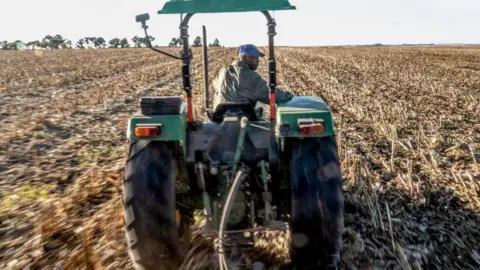Trump threatens to cut funding for South Africa over land policy
 AFP
AFPUS President Donald Trump has said he will cut all future funding to South Africa over allegations that it was confiscating land and "treating certain classes of people very badly".
Land ownership has long been a contentious issue in South Africa with most private farmland owned by white people, 30 years after the end of the racist system of apartheid.
There have been continuous calls for the government to address land reform and deal with the past injustices of racial segregation.
South Africa's president responded to Trump with a post on X: "South Africa is a constitutional democracy that is deeply rooted in the rule of law, justice and equality. The South African government has not confiscated any land."
He added that the only funding South Africa received from the US was through the health initiative Pepfar, which represented "17% of South Africa's HIV/Aids programme".
The US allocated about $440m (£358m) in assistance to South Africa in 2023, according to US government data.
Elon Musk, who was born and grew up in South Africa and is now a Trump adviser, has also joined in the debate, saying the new law discriminated against white people.
"Why do you have openly racist ownership laws?" Mr Musk said to Ramaphosa in a post on X.
On Sunday, Trump wrote on his social media platform Truth Social: "I will be cutting off all future funding to South Africa until a full investigation of this situation has been completed!"
He later said, in a briefing with journalists, that South Africa's "leadership is doing some terrible things, horrible things".
"So that's under investigation right now. We'll make a determination, and until such time as we find out what South Africa is doing — they're taking away land and confiscating land, and actually they're doing things that are perhaps far worse than that."
South Africa's new law allows for expropriation without compensation only in circumstances where it is "just and equitable and in the public interest" to do so.
This includes if the property is not being used and there is no intention to either develop or make money from it, or when it poses a risk to people.
Land ownership has long been a contentious issue in South Africa for more than a century. In 1913, the British colonial authorities passed legislation that restricted the property rights of the country's black majority.
The Natives Land Act left the vast majority of the land under the control of the white minority and set the foundation for the forced removal of black people to poor homelands and townships in the intervening decades until the end of apartheid three decades ago.
Anger over these forced removals intensified the fight against white-minority rule.
In 1994, leader of the African National Congress (ANC) Nelson Mandela became the country's first democratically elected president after all South Africans were given the right to vote.
But until the recently passed law, the government was only able to buy land from its current owners under the principle of "willing seller, willing buyer", which some feel has delayed the process of land reform.
In 2017, a government report said that of the farmland that was in the hands of private individuals, 72% was white-owned. According to the 2022 census white people make up 7.3% of the population.
However, some critics have expressed fears that the new land law may have disastrous consequences like in Zimbabwe, where seizures wrecked the economy and scared away investors.
South African Mineral Resources Minister Gwede Mantashe responded to Trump's comments by telling a mining conference that the country should withhold its minerals if "they [US] don't give us money".
South Africa exports a variety of minerals to the US, including platinum, iron and manganese.
AfriForum, a group focused on protecting the rights and interests of South Africa's white Afrikaner population, wants the government to change the new law to "ensure the protection of property rights".
However, it said it did not agree with Trump's threat to cut funding, suggesting that any punitive measures should be directed at "senior ANC leaders" and not South Africans.
The ANC, led by Ramaphosa, currently governs South Africa as part of a coalition government with nine smaller parties.
Trump also hit out at South Africa during his first term as US president, asking the-then US Secretary of State Mike Pompeo to study the country's "farm seizures and expropriations and the large-scale killing of farmers".
At that time, South Africa accused Trump of seeking to sow division, with a spokesperson saying he was "misinformed".
You may also be interested in:
 Getty Images/BBC
Getty Images/BBCGo to BBCAfrica.com for more news from the African continent.
Follow us on Twitter @BBCAfrica, on Facebook at BBC Africa or on Instagram at bbcafrica
